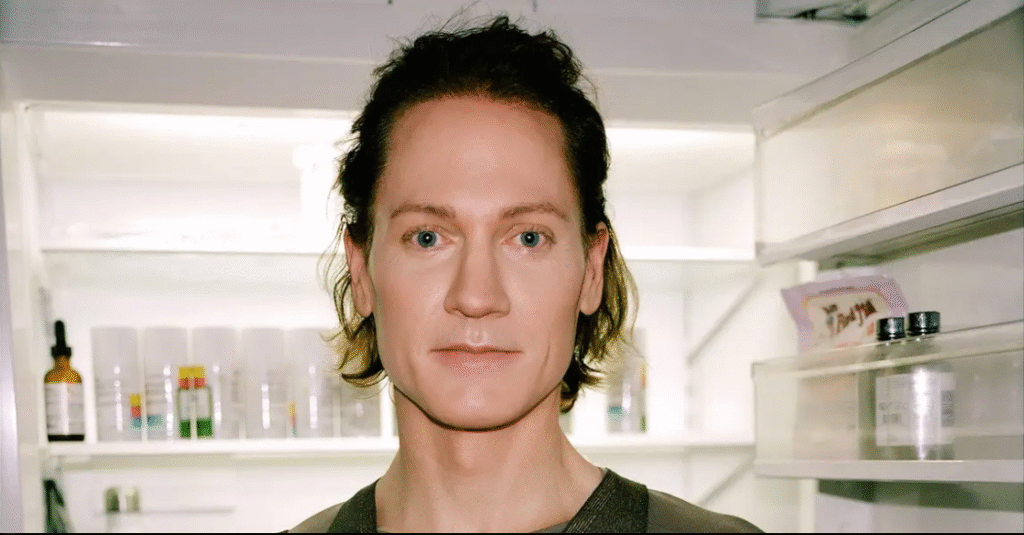1. Early Life & Business Success
Bryan Johnson, born in August 1977 in Provo, Utah. Bryan Johnson earned a BA from Brigham Young University and an MBA from the University of Chicago Booth School of Business.
He founded Braintree in 2007, selling it (alongside Venmo) to PayPal in 2013 for approximately $800 million.
In 2014, he channelled $100M into OS Fund, investing in early-stage ventures in genomics, AI, and synthetic biology.
In 2016, he launched Kernel, investing over $100M personally in brain-machine interface hardware; the company developed devices like Flux and Flow to read brain signals.
2. Project Blueprint: $2 Million for a Youthful Body
Johnson’s health experiment, Project Blueprint, costs around $2 million annually and seeks to reverse his biological age, aiming to maintain organs as if he were 18.
A. Extreme Regimen & Routine
- Over 90–111 pills daily, including rapamycin, metformin, NMN, resveratrol, creatine, turmeric, hyaluronic acid, lithium, omega‑3s, probiotics, adaptogens, and antioxidants.
- Strict vegan diet: ~1,977–2,250 calories/day—70 pounds of vegetables/month, nutrient-rich smoothies, salads, nutty pudding, no added salt or sugar.
- 14-step morning routine: Includes red‑light hair cap, vagus nerve stimulation, sauna/light therapy, heart‑rate variability training, exercise, and fasting until 11 am.
- Sleep optimization: bedtime 8:30 p.m., no fluids after 4 p.m., blue-light filters, blackout conditions, 7–9 hours nightly.
B. Medical Oversight & Scans
A team of 30+ physicians monitors Johnson via regular blood tests, MRIs, ultrasounds, colonoscopies, vascular assessments, and genome scans—adjusting protocols for optimal biomarkers.
C. Plasma Transfusions & Gene Therapy
Johnson underwent a multi-generational plasma exchange, including donations from his teenage son—but discontinued due to lack of benefit and FDA cautions.
He also received a $25K gene therapy (follistatin) on a Caribbean island—an unapproved, experimental treatment aiming to boost muscle and longevity.
3. Outcomes, Setbacks & Scientific Debate
Johnson claims to have reversed his biological age by about 5.1 years, with youthful heart function and pulmonary capacity.
However, his regimen’s high cost and extreme nature has prompted skepticism:
Longevity expert Dr. Andrew Steele said genetics largely dictate longevity, questioning the payoff of such measures.
- A Yale study found rapamycin might accelerate epigenetic aging—Johnson ended his rapamycin use after adverse effects like ulcers and elevated blood sugar.
- Indian hepatologist Cyriac Abby Philips criticized staples like Blueprint supplements as lacking clinical validation (“snake oil”).
4. Blueprint Business & Ideological Shift
Johnson built Blueprint, selling supplement-based products and wellness coaching. Despite media attention, the startup lost large sums—reportedly $1M/month—and failed to meet financial sustainability.
He has now declared his intention to shut down or sell Blueprint, calling it a distraction from his larger philosophical vision: the “Don’t Die” movement, a self-styled ideology aimed at combating death with biotechnology and AI.
5. Philosophical Vision: "Don’t Die" & AI Immortality
In a Wired feature, Johnson articulated his belief that death is an existential failure—he is working on “Bryan AI”, a digital model to preserve consciousness and identity beyond lifespan.
He proposes a movement uniting global society around lifespan extension, ethical AI, and biological optimization.
6. Controversies & Criticisms
Johnson enforced confidentiality agreements (NDAs) on employees and ex-fiancée Taryn Southern, triggering criticism over image control and legal battles.
Critics question the sustainability, scientific foundation, and social equity of interventions accessible only to the ultra-rich.
Key Takeaways
| Dimension | Insight |
|---|---|
| Annual Spend | $2 million/year on longevity |
| Regimen | 90–111 pills/day, strict diet, exercise, scans |
| Outcomes | Biological age reduced ~5 years, youthful organ function |
| Setbacks | Rapamycin side effects, expert skepticism |
| Business shift | Abandoning Blueprint to focus on philosophical mission |
| Larger Vision | “Don’t Die” movement, AI-based immortality preservation |
| Controversy | Lack of clinical validation, elitism, unconventional ethics |
Final Reflection
Bryan Johnson’s life is a bold experiment at the intersection of wealth, wellness, and existential engineering. While his discipline is extraordinary, his regimen remains controversial, with limited scientific endorsement. His journey exposes the allure—and pitfalls—of seeking human immortality through technology. Whether his $2 million annual pursuit transcends niche fascination to inspire broader longevity science or symbolizes biohacking excess remains to be seen.
His transition from supplements to ideology suggests a growing conviction: prolonging life isn’t just a personal quest, but a moral challenge—and perhaps, a new cultural turning point.
Would YOU spend $2M a year to reverse aging? Comment below and join the conversation!
